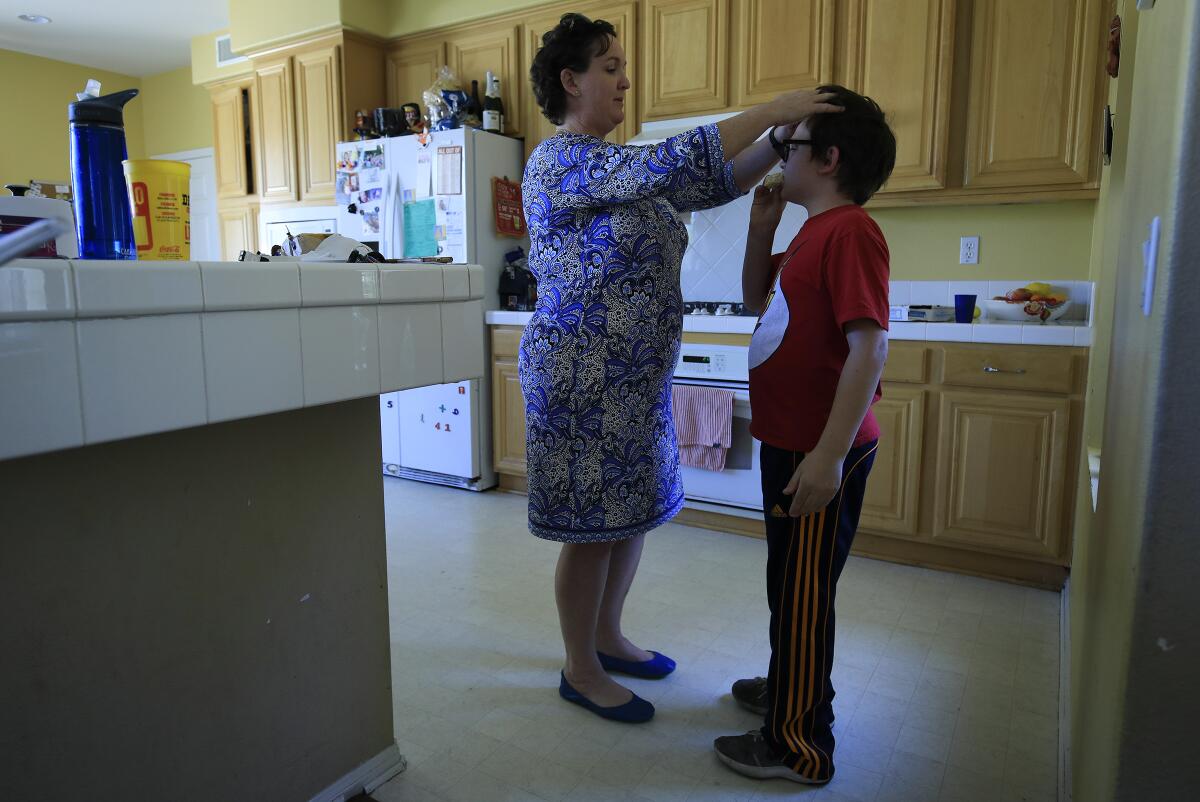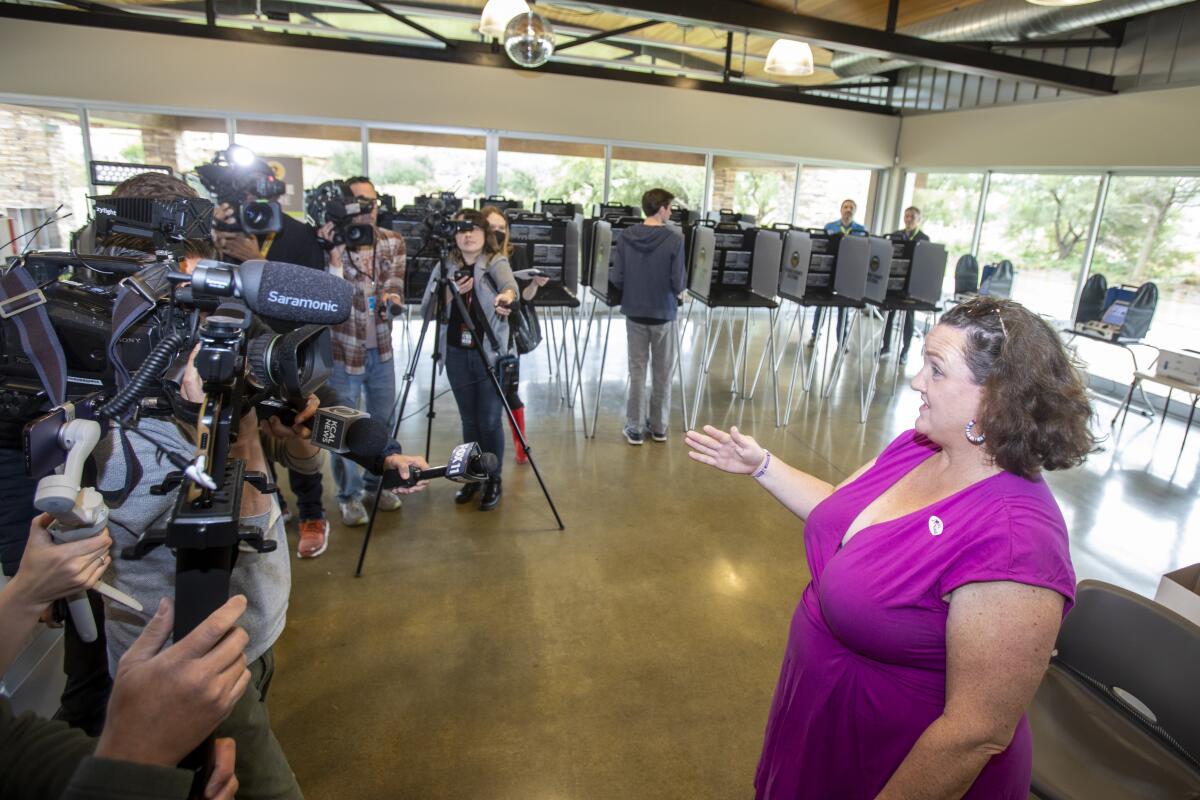The legacy — and disappointment — of Katie Porter’s Orange County revolution

- Share via
Until Katie Porter won her congressional seat in 2018, being a Democrat in Orange County was like rooting for the Angels: Someone has to do it, amirite?
Republicans had held a majority of my home county’s legislative, congressional and supervisorial seats for decades. They maintained a robust ecosystem of candidates, funneling activists onto school boards and party committees to learn how politics works before moving on to higher offices. The GOP way took Richard Nixon and Ronald Reagan to the White House, the latter infamously saying, “Orange County is where the good Republicans go before they die.”
Democrats did hold power in Santa Ana, Irvine and other smaller cities but otherwise mostly went through elections like the butt of a joke in a Monty Python skit. Their luck began to shift in 2016, when Hillary Clinton won Orange County in the presidential election — the first Democrat to do so since FDR during the Great Depression.
In La Palma Park Stadium in Anaheim, a month before the Bay of Pigs invasion, 7,500 students and parents skipped school or work and gathered to learn about communist plans to take over the United States.
But there was no firebrand leader to make local liberals dream of a bluer Orange County. The quintessential Democrat remained Loretta Sanchez, a Republican-turned-Democrat who made O.C. history in 1996 as the first Latino to win a congressional race, then went on to squander that moment with an undistinguished 20-year career that ended in embarrassment when Kamala Harris obliterated her in a 2016 U.S. Senate race.
The idea that Democrats could rule Orange County was so unlikely that I joked during a speech at the Laguna Woods Democratic Club just before the 2018 midterm elections that I would register with the party for the first time if they were able to get a majority of the congressional seats that year. Things weren’t looking good for them. Of the Democratic congressmembers whose seats were mostly in O.C., only incumbents Lou Correa and Alan Lowenthal had won their primaries.
I was proved wrong — and remain a Democrat today. All of O.C.’s congressional seats went Democrat in 2018 for the first time ever. Leading this charge was Porter, the type of Dem that O.C. had rarely seen.

The Iowa native and UC Irvine law professor was dynamic, funny, knew how to fight and never apologized for her progressive beliefs. Orange County hadn’t seen a Democrat like her since Nativo Lopez, a Chicano activist turned Santa Ana Unified school board member who delighted in antagonizing Democrats and Republicans alike in the early 2000s. Porter, who beat incumbent Mimi Walters in an upset, quickly earned a national reputation for her fierce interrogations of bad hombres during congressional hearings, frequently using a whiteboard to explain arcane concepts in a way we plebes could understand.
She represented a new, purple Orange County where Democrats were something no one could’ve foreseen: They were cool.
Democratic party registration surpassed that of Republicans in 2019 — a once-unthinkable achievement. That same year, UNITE HERE Local 11 co-president Ada Briceño took over the Democratic Party of Orange County and brought in the people power organizing and radicalism that local party leaders had long shunned. Porter was a loyal soldier — she helped local candidates win through endorsements and made progressives in the redder parts of O.C. believe they could run and win. Democratic majorities bloomed where it once seemed impossible: Costa Mesa. Huntington Beach. The Board of Supervisors.
Porter was a transformational figure I thought would hold her seat for years and push Orange County even further to the left. That’s why I was disappointed when she announced last year that she would not seek reelection and would instead run for U.S. Senate. Porter figured that deep blue California would embrace her far easier than purple Orange County.
It didn’t.
“Orange County,” the California collection of 34 cities and 3.2 million residents once described by President Reagan as where “all the good Republicans go to die,” died Tuesday.
Early returns from Super Tuesday show Porter in third place, far behind fellow Democrat Adam Schiff and Republican Steve Garvey. Lefties long fretted that she and her fellow traveler, Rep. Barbara Lee, would cancel each other out, but their combined vote total wouldn’t even have put them into the general election.
Porter’s expected loss comes at a bad time for Democrats in Orange County. Since Porter and her congressional class swept O.C., Republicans have yearned for a comeback. In 2020, Young Kim and Michelle Steel — the first Korean American women in Congress along with Washington state’s Marilyn Strickland — won back two seats for the Republicans. In Huntington Beach, a MAGA-majority city council is showing that conspiratorial, retrograde politics can still win in the county that made it an art form.
The grand prize for O.C. conservatives, though, is Porter’s seat. Former county GOP chair Scott Baugh nearly beat her in 2022, and he’s in first place by a wide margin in the race to replace her. Democratic state senator Dave Min stands in second in early returns, and third-place finisher Joanna Weiss has already conceded defeat. If Baugh beats Min in November, Republicans will have clawed back their congressional majority and at least partially deflated the narrative of an ascendant O.C. Democratic Party.
If that happens, Porter should bear some of the blame.

I get why she ran. A U.S. Senate seat doesn’t come onto the electoral market often. She owed it to no one to wait. While she served her constituents well, Porter always struck me as the type of talent who didn’t want to spend their entire career in the proverbial minor leagues.
But sometimes, the big fish should stay in the small pond to defend the minnows from the sharks. And out of all the years Porter should’ve remained in place, it was 2024.
On X this week, she thanked “every person who supported us over the past six years,” writing, “It’s clear Californians are hungry for leaders who break the mold, can’t be bought, and push for accountability in government and across our economy.” Porter otherwise hasn’t made any public announcements about what’s next.
Her future is bright. She can always run for another office or even go after Baugh if he wins. The Newsom administration would be smart to hire her, or the Biden administration if the president returns to the White House. At the very least, Porter would make a great spokesperson for Toyota, whose Sienna minivan she turned into an unlikely symbol of suburban revolt.
Her legacy as a GOP slayer is permanent. Her position in the Orange County history books is secure. I think Porter is awesome. But I’ll always remember her as a what-if. What if, when Orange County needed her most, Porter had run for reelection instead of leaving us for the big time?
What if.
More to Read
Sign up for Essential California
The most important California stories and recommendations in your inbox every morning.
You may occasionally receive promotional content from the Los Angeles Times.















